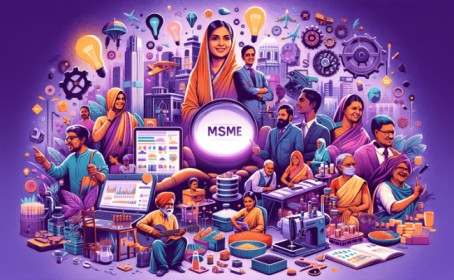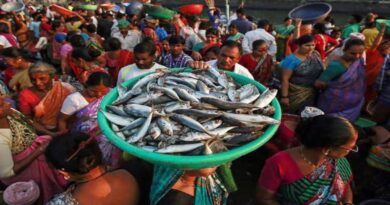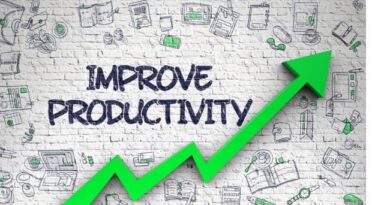MSMEs: A driving force towards India’s vision of ‘Vikshit Bharat’ by 2047

“India, that is, Bharat”, a nation brimming with youthful energy and entrepreneurial spirit, has set its sights on a remarkable goal: to transform into a ‘Vikshit Bharat’ – a developed India – by the year 2047. This ambitious vision, articulated by Prime Minister Narendra Modi, encapsulates a holistic transformation encompassing economic prosperity, social progress, technological advancement, and environmental sustainability. While the journey towards this goal will require concerted efforts from all sectors, the Micro, Small, and Medium Enterprises (MSMEs) are poised to play a pivotal role in shaping India’s destiny.
India’s vision of a ‘Viksit Bharat’ by 2047 hinges significantly on the robust growth and development of its Micro, Small, and Medium Enterprises (MSMEs).

MSMEs, often hailed as the backbone of the Indian economy, constitute a vibrant and dynamic sector that contributes significantly to employment generation, economic growth, and social development. With their agility, adaptability, and innovative spirit, MSMEs are uniquely positioned to drive India’s transformation into a developed nation.

‘Vikshit Bharat’ is not just about economic growth, it also encompasses social progress, ensuring that the fruits of development reach all segments of society. MSMEs play a critical role in this aspect by generating employment opportunities, particularly for marginalized communities, women, and youth. Moreover, MSMEs often operate in rural and semi-urban areas, contributing to regional development and reducing migration to urban centers. They also foster entrepreneurship at the grassroots level, empowering individuals and communities to participate in the nation’s growth story.
By 2047, India aims to achieve inclusive growth, where every citizen has access to opportunities and a decent standard of living. MSMEs, with their widespread presence and focus on social inclusion, will be essential in realizing this vision. India envisions itself as a global economic powerhouse, and MSMEs will be at the forefront of this transformation. Their ability to adapt to evolving market demands, embrace new technologies, and cater to niche markets will be crucial in driving economic growth and creating a more prosperous India.
Role of MSMEs in Economic Development
MSMEs are the lifeline of the Indian economy. Their contribution to India’s Gross Domestic Product (GDP), foreign exchange earnings, the export sector, and most importantly, employment generation is significant.
- As per the latest information received from the Ministry of Statistics & Programme Implementation, the share of MSME Gross Value Added (GVA) in all India Gross Domestic Product (GDP) for FY 2022-23 is 30.1%. This shows the significant share of MSMEs in the economic pie, highlighting their crucial role in national growth.
- MSMEs are competing in the global market and are generating valuable foreign exchange reserves, which is crucial for a developing country like India. As per the information culled out from the Data Dissemination Portal of Directorate General of Commercial Intelligence and Statistics (DGCIS), the share of export of MSME specified products in all India exports contribute a whopping 45.79% of India’s total exports for FY 2024-25 (upto may’2024).
- MSMEs manufacture a vast array of products across sectors, encompassing over 8,000 + different categories. Their product diversity is strengthening India’s export basket and they are offering a wider range of goods to the international market.
- MSMEs are the largest employment generators in India. As on 16.07.2024, the total employment reported by the MSMEs on the Udyam Registration Portal (since 01.07.2020 to 16.07.2024) is 20.39 crore (including informal micro enterprises registered on Udyam Assist Platform). (Source- PIB)
- Unlike large corporations, MSMEs are often located in rural and semi-urban areas. This not only promotes regional development but also provides crucial employment opportunities for the local population, and thus stopping rural-urban migration.
- MSMEs offer significant opportunities for women entrepreneurs. As of 31st January, 2024, around 20.50% of MSMEs are owned by women, fostering female economic empowerment and participation in the workforce.
- MSMEs play a vital role in alleviating poverty by providing income opportunities for a large segment of the population.
- The flourishing MSME sector fosters a culture of entrepreneurship, inspiring individuals to start their own businesses and contribute to the economic landscape. Start-up India, which is a flagship initiative of the Government of India, intended to catalyze startup culture and build a strong and inclusive ecosystem for innovation and entrepreneurship. India is home to more than 100 unicorns with a total valuation of upwards of US$ 385 billion as of 2024. (Source- ET 11.01.2025)
How MSMEs will fulfill the vision of Vikshit Bharat by 2047
In the 21st century, technology is the driving force behind progress, and ‘Vikshit Bharat’ envisions India as a technologically advanced nation. MSMEs, with their agility and adaptability, are well-suited to embrace new technologies and drive innovation.
They are increasingly adopting digital tools, automation, and data analytics to enhance their productivity, efficiency, and competitiveness. Furthermore, MSMEs are playing a crucial role in developing indigenous technologies and solutions that cater to India’s unique needs. By 2047, India aspires to be a global leader in technology and innovation. MSMEs, with their innovative spirit and focus on technology adoption, will be instrumental in achieving this goal.
‘Vikshit Bharat’ is not just about economic and technological progress; it also emphasizes environmental sustainability. MSMEs, with their resource efficiency and focus on local solutions, can play a significant role in protecting the environment.
They are increasingly adopting sustainable practices, such as waste reduction, energy efficiency, and the use of renewable resources. Moreover, MSMEs are contributing to the development of green technologies and solutions that can help mitigate climate change and promote a circular economy.
By 2047, India aims to achieve sustainable development, balancing economic growth with environmental protection.
MSMEs, with their focus on sustainability, will be crucial in realizing this vision.
Challenges faced by MSMEs
Despite their immense potential, MSMEs face several challenges that hinder their growth and contribution to ‘Vikshit Bharat’. These include:
- Access to finance: MSMEs often struggle to access adequate credit and capital, which limits their ability to invest in new technologies, expand their operations, and compete in the global market.
- Infrastructure constraints: Inadequate infrastructure, such as power, transportation, and communication networks, can hamper the efficiency and productivity of MSMEs.
- Technological gaps: Many MSMEs lack the technical expertise and resources to adopt new technologies and innovate, which puts them at a disadvantage in the global market.
- Regulatory hurdles: Complex and cumbersome regulations can create barriers for MSMEs, making it difficult for them to start and operate their businesses.
- Skill gaps: MSMEs often face a shortage of skilled workers, which limits their ability to adopt new technologies and compete in the global market.
To overcome these challenges and unlock the full potential of MSMEs, the government, industry, and other stakeholders need to work together to create a supportive ecosystem. This includes:
- Improving access to finance: The government and financial institutions need to develop innovative financing solutions that cater to the specific needs of MSMEs, such as collateral-free loans, venture capital, and crowdfunding platforms.
- Developing infrastructure: The government needs to invest in developing robust infrastructure, including power, transportation, and communication networks, to support the growth of MSMEs.
- Promoting technology adoption: The government and industry need to provide training, resources, and incentives to encourage MSMEs to adopt new technologies and innovate.
- Simplifying regulations: The government needs to streamline regulations and reduce bureaucratic hurdles to make it easier for MSMEs to start and operate their businesses.
- Bridging skill gaps: The government and industry need to invest in skill development programs to equip workers with the skills needed by MSMEs.
Assistance provided to MSMEs by GOI toward making a ‘Vikshit Bharat 20247’
- The roadmap for Viksit Bharat in relation to the MSME sector is multifaceted, involving financial support, regulatory reforms, infrastructure development, digitalization, and a focus on quality and innovation. The government’s budgetary and policy measures are designed to empower MSMEs to grow and compete on a global scale, thereby contributing to the overarching goal of transforming India into a developed nation by 2047.
- The “Atmanirbhar Bharat Abhiyan” was introduced in May, 2020 to revive the MSME sector with financial support mechanisms such as collateral-free loans and funds for capacity augmentation. The long-term vision for MSMEs includes competitiveness, sustainability, and innovation, with a focus on credit support, skilling, infrastructure, and market access.
- The government is promoting digital mobility for automotive MSMEs, which is expected to drive the industry forward and contribute to the creation of a developed Bharat. The PM Gatishakti National Master Plan aims to enhance multi-modal connectivity & logistics aimed at benefiting MSMEs through improved infrastructure in a cost-efficient but with world- class standards.
- Schemes like the PM Mudra Yojana, PM Vishwakarma Yojana, and the MSME Credit Guarantee Scheme have been instrumental in providing affordable loans and working capital to MSMEs. The government has also been proactive in removing barriers to MSME development by revising its definition and eliminating over 40,000 compliances.
- MSMEs are encouraged to enhance their quality and durability to meet global standards, with the government supporting small-scale industries and fostering innovation in emerging sectors like Electric Vehicles (EVs) etc, which have a very high global demand. Production Linked Incentive (PLI) scheme by Government of India, amounting to approximately Rs 26,000 crore for the Auto and Auto Components sector not only promotes manufacturing but also incentivizes hydrogen vehicles.
- Significant investments are being made in the MSME sector, with states like Maharashtra, Tamil Nadu, and Gujarat demonstrating substantial pledges for growth. The sector’s Gross Value Added (GVA) and export contributions are monitored, indicating its economic impact.
- The National Education Policy 2020 and the Skill India Mission are key initiatives aimed at training and upskilling youth, which will directly benefit the MSME sector by providing a skilled workforce.
- The vision for Viksit Bharat includes harmony with nature, which implies that MSMEs will also need to adopt sustainable practices to align with this goal.
Conclusion:
MSMEs are not just small businesses, they are the building blocks of a prosperous and developed India. Their contributions to economic growth, social progress, technological advancement, and environmental sustainability are indispensable in realizing the vision of ‘Vikshit Bharat’ by 2047. MSMEs are the cornerstone of the Indian economy, driving growth, generating employment, and fostering innovation.
To fully realize the potential of MSMEs in making Viksit Bharat, it is crucial to create a conducive ecosystem that fosters their growth and competitiveness. This includes streamlining regulations, improving infrastructure, promoting digitalization, and enhancing skill development.
By addressing the challenges faced by MSMEs, India can unleash their full potential and empower them to play a leading role in the nation’s transformation. By facilitating access to finance, infrastructure, and market opportunities, the government and institutions can empower these dynamic enterprises to reach their full potential and contribute even more significantly to India’s economic future. Viksit Bharat represents a bold vision for India’s future and the success of this vision will depend on the collective effort of the government, businesses, and citizens alike.
By:
Suraj Kumar Shoundik (Chief Mangager, Research, SBA, Gurugram)




